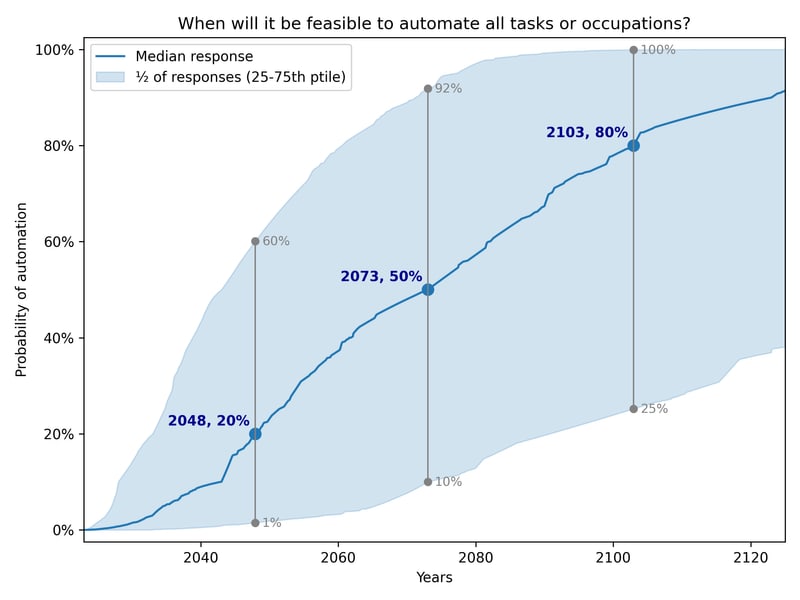In my opinion, we have known that the risk of AI catastrophe is too high and too close for at least two years. At that point, it’s time to work on solutions (in my case, advocating an indefinite pause on frontier model development until it’s safe to proceed through protests and lobbying as leader of PauseAI US).
Not every policy proposal is as robust to timeline length as PauseAI. It can be totally worth it to make a quality timeline estimate, both to inform your own work and as a tool for outreach (like ai-2027.com). But most of these timeline updates simply are not decision-relevant if you have a strong intervention. If your intervention is so fragile and contingent that every little update to timeline forecasts matters, it’s probably too finicky to be working on in the first place.
I think people are psychologically drawn to discussing timelines all the time so that they can have the “right” answer and because it feels like a game, not because it really matters the day and the hour of… what are these timelines even leading up to anymore? They used to be to “AGI”, but (in my opinion) we’re basically already there. Point of no return? Some level of superintelligence? It’s telling that they are almost never measured in terms of actions we can take or opportunities for intervention.
Indeed, it’s not really the purpose of timelines to help us to act. I see people make bad updates on them all the time. I see people give up projects that have a chance of working but might not reach their peak returns until 2029 to spend a few precious months looking for a faster project that is, not surprisingly, also worse (or else why weren’t they doing it already?) and probably even lower EV over the same time period! For some reason, people tend to think they have to have their work completed by the “end” of the (median) timeline or else it won’t count, rather than seeing their impact as the integral over the entire project that does fall within the median timeline estimate or taking into account the worlds north of the median. I think these people would have done better to know like 90% less of the timeline discourse than they did.
I don’t think AI timelines pay rent for all the oxygen they take up, and they can be super scary to new people who want get involved without really helping them to action. Maybe I’m wrong and you find lots of action-relevant insights there. If it’s the case that timeline updates frequently update your actions, your intervention may not be robust enough to the assumptions that go into the timeline or the timeline’s uncertainty, anyway. In which case, you should probably pursue a more robust intervention. Like, if you are changing your strategy every time a new model drops with new capabilities that advance timelines, you clearly need to take a step back and account for more and more powerful models in your intervention in the first place. Looks like you shouldn’t be playing it so close to the trend line. PauseAI, for example, is an ask that works under a wide variety of scenarios, including AI development going faster than we thought, because it is not contingent on the exact level of development we have reached since we passed GPT-4.
Be part of the solution. Pick a timeline-robust intervention. Talk less about timelines and more about calling your Representatives.


I agree.
A big reason why I think timeline forecasting gets too much attention—which you alluded to— is that no matter how much forecasting you do, you'll never have that much confidence about how AI is going to go. And certain plans only work under a narrow set of future scenarios. You need to have a plan that works even if your forecast is wrong, because there will always be a good chance that your forecast is wrong.
Slowing down AI has downsides, but it seems to me that slowing down AI is the plan that works under the largest number of future scenarios. Particularly an international treaty to globally slow down AI, so that all developers slow down simultaneously. That seems hard to achieve, but I think peaceful protests increase the chance of success by cultivating political will for a pause/slowdown treaty.